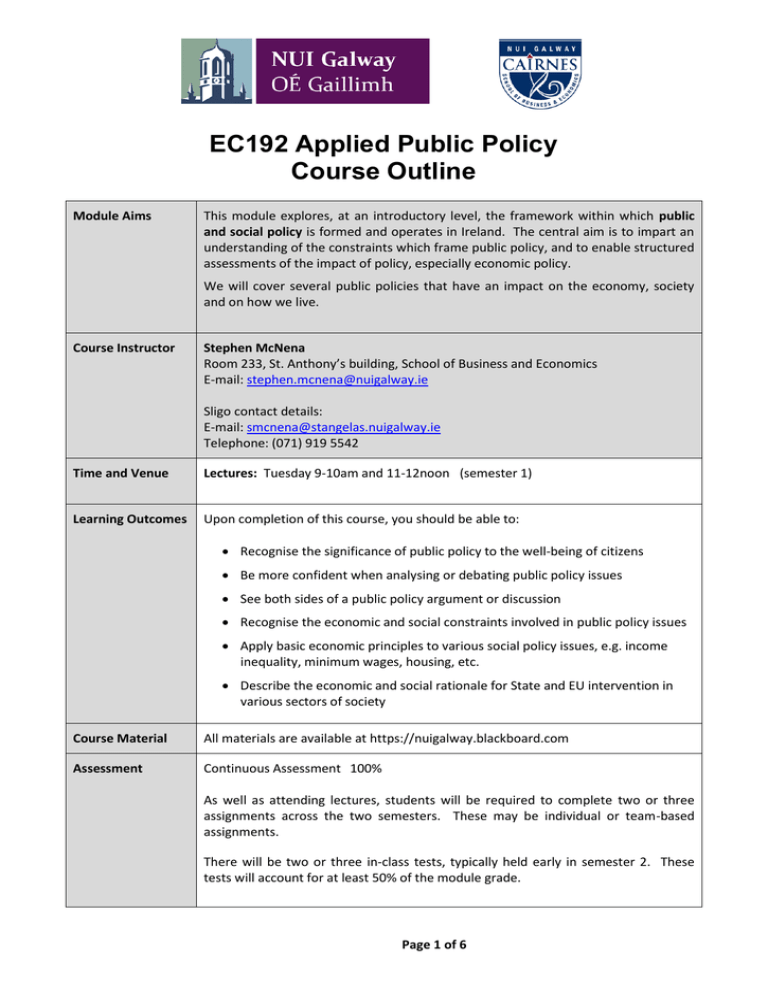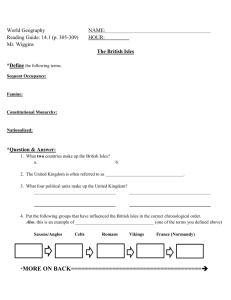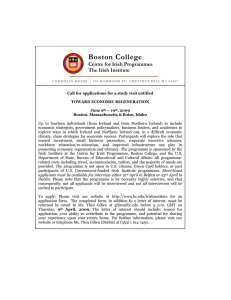EC192 Applied Public Policy Course Outline
advertisement

EC192 Applied Public Policy Course Outline Module Aims This module explores, at an introductory level, the framework within which public and social policy is formed and operates in Ireland. The central aim is to impart an understanding of the constraints which frame public policy, and to enable structured assessments of the impact of policy, especially economic policy. We will cover several public policies that have an impact on the economy, society and on how we live. Course Instructor Stephen McNena Room 233, St. Anthony’s building, School of Business and Economics E-mail: stephen.mcnena@nuigalway.ie Sligo contact details: E-mail: smcnena@stangelas.nuigalway.ie Telephone: (071) 919 5542 Time and Venue Lectures: Tuesday 9-10am and 11-12noon (semester 1) Learning Outcomes Upon completion of this course, you should be able to: Recognise the significance of public policy to the well-being of citizens Be more confident when analysing or debating public policy issues See both sides of a public policy argument or discussion Recognise the economic and social constraints involved in public policy issues Apply basic economic principles to various social policy issues, e.g. income inequality, minimum wages, housing, etc. Describe the economic and social rationale for State and EU intervention in various sectors of society Course Material All materials are available at https://nuigalway.blackboard.com Assessment Continuous Assessment 100% As well as attending lectures, students will be required to complete two or three assignments across the two semesters. These may be individual or team-based assignments. There will be two or three in-class tests, typically held early in semester 2. These tests will account for at least 50% of the module grade. Page 1 of 6 Workload Credit weighting Lecture hours Directed study, preparation for class Assignments Preparation for in-class tests Tests Total workload 5 ECTS 48 hours 24 hours 13 hours 12 hours 3 hours 100 hours Textbooks & Readings Principal textbook As this module is so broad, there is no core text. Recommended textbooks Healy, S., Reynolds B. and Collins, M., eds. (2006) Social Policy in Ireland, Dublin: The Liffey Press. O Grada (1997) A Rocky Road: the Irish Economy since the 1920s, Manchester: Manchester University Press. O’Hagan, J. and Newman, C., eds. (2011) The Economy of Ireland, 11th ed., Dublin: Gill and Macmillan. Central Statistics Office Other resources www.cso.ie Eurostat The Economist The Economic and Social Research Institute www.esri.ie The OECD www.oecd.org Irish Economy blog www.irisheconomy.ie See links to additional resources on Blackboard Topics 1. The Role of the State in Irish Economic Development since 1922 2 Social Partnership 3 Irish Economy since 1987 4 Taxation policy 5 Poverty and Income Inequality 6 Minimum Wage 7 The role of the European Union 8 Regional Policy 9 Competition Policy Page 2 of 6 Attendance and student engagement Please note that full attendance at all classes is very important. Attendance at classes will be monitored, and will be recorded. Students who have a poor attendance record will be brought to the attention of the BA Course Co-ordinator. Please note that enrolment on a full-time programme means a commitment to 40-50 hours of total student effort per week throughout all the weeks of each semester. Such levels of engagement and activity will make it more likely that students will acquire a high level of knowledge and understanding of their chosen subjects, feel confident in their abilities and experience less stress during assessments and be better prepared for subsequent years. To give students an idea of what is expected of them, a module worth 5 ECTS should reflect 100125 hours of total student effort. Mobile phones in class The use of a mobile phone in class may lead to you losing credit for attendance at that class. Page 3 of 6 Course Outline 1. The Role of the State in Irish Economic Development Here we examine the different economic policies pursued by the public administration since Ireland achieved Independence in 1922. 2 The Situation at Independence - population and incomes The first decade, 1922-1932 Self-sufficiency and the Economic War Post-war stagnation Ireland’s Golden Age, 1960-1979 Oil crisis, the fiscal response, crisis in the public finances An overview Social Partnership Many commentators argue that Social Partnership underpinned the turnaround in the Irish economy after 1987. Here we find out what is Social Partnership, we briefly look at the background and evolution of Social Partnership in Ireland and how it works in practice. We will also consider some of the criticisms directed at it. 3 Economic planning Wage bargaining Social partners National Agreements The results Future prospects The Economy since 1987 Here we will study what happened in the Irish economy from the crisis in 1986/87, through the strong economic expansion that started in 1993/94, to where we find ourselves today. 4 Taxation policy People often (mistakenly) complain that taxes are too high in Ireland, while economists point to tax reform as a central tool of economic policy. We are concerned here with issues such as: The overall level of taxation in Ireland The composition of the tax burden International comparisons Any negative or distortionary effects caused by the taxation system The progressivity of the tax system Potential future reforms of policy Page 4 of 6 5. Poverty and Income Inequality It is obvious to everybody that income is not distributed equally in society. Indeed, some people argue that Ireland is one of the more unequal societies in the industrialised world. Also, even though Ireland is now one of the richest countries in the world, there still exists a certain amount of poverty. We will examine what is meant by absolute and relative poverty, and outline the various ways in which the level of poverty is measured. We will examine: 6. Existing levels of income inequality in Ireland Evolution of Irish income inequality International comparisons How effective is the income redistribution system Poverty Minimum Wage The Government introduced a legal national minimum wage in April 2000. Many economists oppose such a move. We will discuss the costs and benefits of the minimum wage and examine the thinking behind the economists’ opposition. 7. The role of the European Union When Ireland joined the European Community in 1973, another dimension was added to the economy, society and the policy-making process in Ireland. 7.1 EU decision making Here we examine the various institutions of the EU and how they interact in the decision-making process. 7.2 The Common Agricultural Policy One of the reasons Ireland joined the EEC in 1973 was to allow the farming sector to benefit from the Common Agricultural Policy (CAP). The CAP is often in the news, maybe due to farm incomes being under pressure, or else due to the huge cost to maintain the CAP. Evolution of the CAP How it works Current and future reforms 7.3 Structural Funds Ireland has been the recipient of significant levels of Structural Funds from the EU since 1989. Here we look at how the money was spent, what effects it had and how the Government has coped with the decrease in structural funding. Page 5 of 6 7.4 Enlargement of the EU On 1st May 2004, the European Union undertook its largest ever expansion, growing from 15 to 25 countries. It subsequently grew to 27 member-states, and in 2013 Croatia joined, becoming the 28th member state. These enlargements have effects in many areas of society and the economy: • Trade (hopefully more Irish exports to the Accession states) • Migration (maybe more supply of skilled workers for the Irish economy) • Agriculture (CAP under pressure) • Regional policy (financial aid to be directed towards the new states, less for Ireland) 8. Regional Policy Economic activity is clearly not evenly distributed around the country. There are regional disparities in terms of employment, incomes and opportunities. Both the Irish Government and the EU have various policies to attempt to redress these imbalances. Examples were the National Spatial Strategy and the planned program of Civil Service Decentralisation. 9. Competition Policy Although many sectors of the Irish economy are exposed to competition, the State still has an important role to play in preventing the operation of cartels and other anti-competitive behaviour. In this section, we look at some case studies in Competition Policy from Ireland and the UK and examine the effect of privatisation. 10. Housing Housing is obviously an important feature of any society. In Ireland, large increases in house prices and rents during 1995-2007 made housing one of the most important political issues. The price rises were accompanied by a massive expansion in house building and development. Following this bubble in prices, there was a collapse in the construction and property sector. We will examine: State policy on housing The reasons for the large price rises The Government’s response Other potential reforms Page 6 of 6






